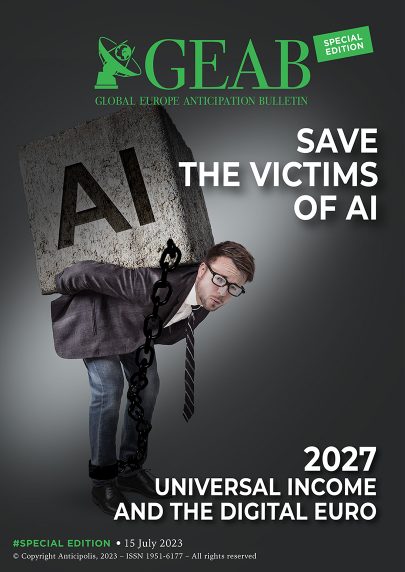GEAB July 2023

International relations and geopolitical tensions are fuelled by a myriad of factors, the most well-known of which is access to mineral resources and agricultural products. The microprocessor war reveals new tensions linked to the new economies.[1] Indeed, as soon as a resource essential to the smooth running of an economy becomes scarce, the framework for international cooperation breaks down and tensions return to the fore.
The emergence of a multipolar world, a crisis of power in the West, the emergence of non-Western middle classes,[2] the explosion in demand for economic resources of all kinds[3]… are, of course, at the root of all the tensions we know about.
But in this issue, we would like to draw attention to an area of tension that is already at work but has not yet been properly identified: the scarcity of human resources and the strategies being developed to access talent.[4]
It may seem paradoxical, in the age of AI and the supposed replacement of human work by ‘intelligent’ machines, to anticipate a deepening crisis in human resources at a global level. And yet…
In fact, since the advent of the Internet and the use of new technologies, with Artificial Intelligence (AI) long on the horizon, the messages sent to the brains of managers, citizens and employees suggest that humans will become a negligible component in the smooth running of the economy. At most, the economy will need them to consume the goods produced and to pump out data intended to improve the market offering or the effectiveness of AI.[5]
Of course, it’s obvious that if people stop working, they won’t be able to buy anything. So, the less idiotic are thinking of models that involve taxing production and capital rather than wages, or even robots[6] (a concept that remains to be defined), to finance a universal income that would confirm the transformation of the worker into a consumer.
All these futures have one thing in common: they sideline the imperative of education and training. In fact, education became compulsory in the 19th century because the industrial economy of the time needed well-trained minds. And if, for the last thirty years at least, investment in education has been declining, perhaps it is because the hyper-consumerist model that continues to dominate the future of the economy has no need at all for well-trained minds… on the contrary.
But as we enter the post-Covid era of the ‘Great Resignation’, and even after the symbolic arrival of ‘AI-for-all’ represented by ChatGPT, everyone is talking about the human factor again, realising – a little too late – that AI may transform HR as we have known it, but it will not eliminate it.
In fact, the migratory flows of recent decades are a perfect forerunner of what is to come. These migrants have come to replace a workforce that automation led us to believe we would no longer need, and which we therefore stopped training. Gone are the days of manual labour in schools, gone are the days of technical training, gone are the days of foreign labour![7]
The same thing will happen (or has already started to happen) for the more technically advanced professions: engineers, doctors, architects, financiers, designers, etc., who will indeed experience a crisis, but a crisis of transformation rather than a crisis of disappearance.
Yet the school systems of recent decades have deliberately shifted from the objective of educating free and enlightened citizens to that of training professionals. Too bad, because the former are more adaptable…
As a result, companies are already facing not only a shortage, but also a growing need to train their own recruits, as demonstrated by all the “corporate universities” that are springing up[8]… and which should seriously alarm the entire higher education system.
In addition to the challenge of adapting skills that companies will have to face, there are the moral demands of an ideologised youth disconnected from economic realities, a youth that will go online and do business independently rather than join a ‘company’.[9]
Of course, there is also the reality of demographic decline, particularly in the West and Asia, but not only there, which is creating a shortage of young people… and therefore of young talent. Then there’s the explosion in drug use, which of course primarily affects young people who are already under-educated.[10]
As a result, companies will have to turn to foreign “brainpower”, a process that is a priori facilitated by the habit of teleworking.[11] But, in the process, all the world’s companies will find themselves competing to attract this international talent,[12] which, let’s face it, is not all that plentiful.[13] Admittedly, emerging markets are producing more brains than ever before,[14] but they are also using them more and more. And we are at odds with the few countries that produce a plethora of talent, such as China (ranked 8th according to INSEAD).[15]
From then on, companies will turn to their governments to help them find the talent they need to run their businesses: on the one hand, by fixing an inadequate education system with Covid money,[16] but also, as this will not be enough, by implementing more or less aggressive talent acquisition strategies.
The countries with the best access to these brains are always the English-speaking countries, which, thanks to the immense popularity of their language, attract young foreigners into the English-speaking education systems through countless tests (Toefl, etc.) and then direct them to their universities, countries and companies.[17]
But these strategies for capturing the resources that are vital to a country’s prosperity are already giving us a glimpse of the arrival of protectionist measures when it comes to talent. How long will it be before the EU calls into question the Erasmus-Mundus programme and the instructions for internships abroad that have flourished over the last two decades? … unless Erasmus-Mundus is precisely a tool for capturing international talent … even if it means losing a few young Europeans.[18]
Africa and India have had and still have recourse to sending their young people to the West, mainly to earn foreign currency and finance their development. On the one hand, some countries are adopting selective policies (USA, Canada) that others have not dared to put in place (EU). On the other hand, as we anticipated in April 2019, the more these continents develop thanks to the financial inflows and the help of new development players (China, the Middle East, etc.), the more they will need to keep their talent at home.[19]
We therefore continue to anticipate that the global skills shortage will soon lead to the introduction of protectionist measures by the poorest of the poor countries, which will also take advantage of the fact that Western companies are setting up there to gain direct access to their human resources, gradually redirecting the slowdown in migration flows in their favour.
Among the many factors of geopolitical tension, the capture and retention of human resources is not the least of them, and it is useful to bear this in mind if we are to understand this period in world history. Countries, companies, schools, professionals and young talent need to be fully aware of this reality in order to develop the right strategies.
That is the theme of this special edition of the GEAB, which looks at specific examples of the impact of the talent crisis in the space industry, the impact of AI on growing skills inequalities and generational issues.
Enjoy your summer reading!
Not a GEAB reader yet ? Subscribe
Join also the GEAB Community on LinkedIn for more discussions on this topic.
_______________________
[1] Source: Forbes, 07/05/2023
[2] Source: Fortune, 16/06/2023
[3] For example: ” Commodity trading value pools have grown substantially, almost doubling from $27 billion in 2018 to an estimated $52 billion of EBIT in 2021 (Exhibit 1). The majority of this growth was fueled by EBIT from oil trading, which were estimated to have increased by more than 90 percent to $18 billion during this period. Power and gas trading was just behind, rising from $7 billion to $13 billion. These value pools maintained their upward trajectory in 2022. The market will likely attract new entrants that enhance competition, and our analysis suggests that its overall value will continue to grow.” Source: McKinsey, 29/01/2023
[4] In the United States (source: SHRM, 23/01/2023); in Italy (source: Reuters, 09/06/2023); in Japan (source: Asia News Network, 12/06/2023); and even in India (source: Times of India, 10/02/2023).
[7] Source: A perfect example is the German reform adopted on 7 July by the Bundesrat, which facilitates the immigration of foreign professionals: “IT specialists, who are currently in particularly high demand in this country, can already come to Germany without a recognised diploma. For them, the salary threshold will be lowered, as will the length of professional experience required. What’s more, IT specialists will no longer have to prove their knowledge of the German language. Bundesregiegung, 07/07/2023
[8] Source: ELMLearning, 28/05/2022
[9] Source: WorkPlaceInsight, 02/03/2022
[10] Source: DestinationForTeens, 11/11/2022
[12] Source: MoreThanDigital, 28/06/2023
[13] Source: Hcamag, 12/04/2023
[14] Source: WorldBank, 11/04/2023
[15] Source: Global Talent Competitiveness Index 2022
[16] Sources: WhiteHouse, France, UK, Italy,…
[17] In India, for example. Source: AECCGlobal.in
[18] Source: Brain drain or brain gain, Agile 2018

From agriculture and printing press to the Internet, all technological advances have had socio-economic consequences, leading to profound changes in society. Easy access to the power of artificial intelligence will [...]
This is one of the most serious crises facing the space sector, particularly in the West, and it will determine the future balance of powers. Already listed as one of [...]
Fabienne Goux-Baudiment has a degree in political science and a doctorate in social sciences. She is the managing director of SAS, a study, research and consultancy centre in the field [...]
Artificial Intelligence: Jump on the bandwagon! After offering you several anticipations and analyses on the future challenges of AI in this issue, our team would now like to take a [...]

Comments